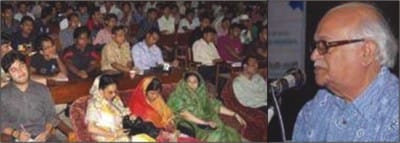Call to implement new education policy

Prof Zillur Rahman Siddiqui speaks at a seminar on 'Proposed national education policy and our expectations' at the mini auditorium of Shahjalal University of Science & Technology (SUST) in Sylhet yesterday, organised by the SUST Debating Society in association with the university. Photo: STAR
Educationists at a seminar yesterday stressed the need to take immediate measures to implement the proposed education policy, which has already been finalised.
They called on the government to go ahead with the visionary document, prepared by a committee of noted educationists to initiate major changes in the education sector.
The seminar on 'Proposed national education policy and our expectations' was held at the mini auditorium of Shahjalal University of Science & Technology (SUST) in Sylhet, organised by the SUST Debating Society in association with the university.
Former vice chancellor of Jahangirnagar University Prof Zillur Rahman Siddiqui, Prof Muhammad Zafar Iqbal of SUST, former adviser to the caretaker government Rasheda K Chowdhury, Editor and Publisher of The Daily Star Mahfuz Anam, Dr Md Yunus of SUST and Debating Society President Tahminur Mukto spoke at the seminar presided over by SUST Vice Chancellor Prof Dr Saleh Uddin Ahmed.
Protik Mandal, a student of the university, read out a paper, which was adjudged the best in a contest organised by the Debating Society.
Prof Zafar Iqbal, a member of the committee that prepared the draft education policy, said, “We had to finish the huge task within a short time and we tried our best.”
Elaborating some major points of the policy, he said there will be a single curriculum for all at primary level, which would be extended up to class eight. The primary education would be compulsory and free for all.
The secondary education would be extended up to class 12, he said, adding that a separate ministry for the higher education had also been proposed.
He also said the children of indigenous communities should be taught by teachers from their own community at primary level.
Besides, separate pay scale for primary teachers and raising their status have been proposed, which would help improve the quality of education, Prof Zafar Iqbal said.
He also hoped that in line with the Dakar Framework for Action, the government would raise the allocation for the education sector to 6 percent of GDP from 2.67 percent at present.
However, the extreme rightist and left-leaning groups are opposing the draft education policy, he said.
Referring to a survey conducted in February, Rasheda K Chowdhury said 12 lakh children did not go to primary school this year.
The figure would be 20 lakh, if the children with disabilities are included, she said, adding that “We are yet to include education as a basic right in the constitution.”
She also said the greater Sylhet region is lagging behind in many fields. Only 25 percent of children in tea garden areas have access to education.
Prof Zillur Rahman Siddiqui appreciated the move to extend the primary education up to class eight.
He also said more than 50 percent of children dropped out at primary level, which is worrisome. Steps should be taken to stop such trend.
Although some quarters are doing politics in the name of opposing the draft education policy, the government should go ahead with it, he said.
Editor of The Daily Star Mahfuz Anam called for implementing the proposed education policy, saying that it will help meet the current challenges.
The leading educational institutions still lack proper atmosphere for education, he said, adding that unhealthy students politics as well as teachers' politics are mainly responsible for it.

 For all latest news, follow The Daily Star's Google News channel.
For all latest news, follow The Daily Star's Google News channel. 



Comments